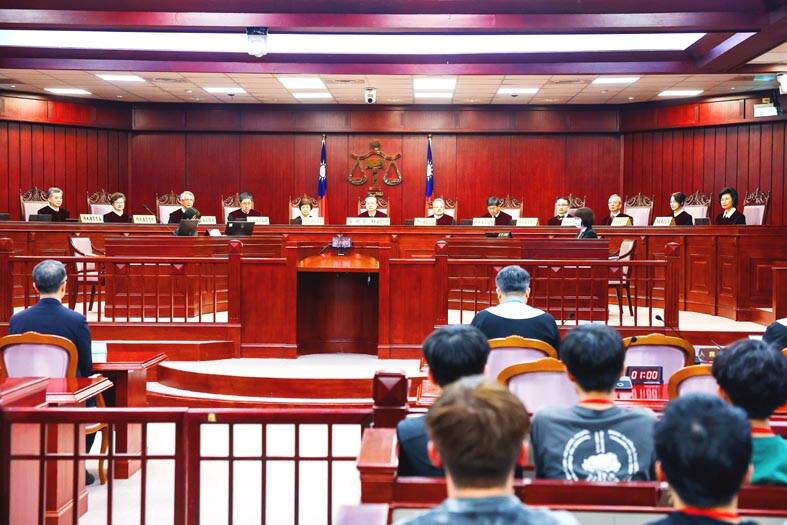The Democratic Progressive Party (DPP) yesterday panned a Legislative Yuan report published on Monday that suggested that lawmakers do not need to observe Constitutional Court judgements, calling on the opposition parties not to upset the separation of powers.
The report by the Organic Laws and Statutes Bureau said that constitutional judgements should not be elevated to the level of the Constitution, nor should they replace existing constitutional law.
In presenting the report, bureau head Kuo Ming-cheng (郭明政) said that under the current system, the Constitutional Court and the Legislative Yuan were “competing agencies with powers to legislate.”

Photo: CNA
As long as all branches of government maintain loyal to the Constitution, the separation of powers would work as intended and the people’s rights would remain protected, the report said.
The Legislative Yuan, as the embodiment of public will, should be empowered to correct any legislation instituted through Constitutional Court rulings, it said, citing how the court’s ruling on capital punishment went against public opinion.
Legislative Speaker Han Kuo-yu (韓國瑜) tapped Kuo to assume his current post last year.
Kuo, considered aligned with Legislative Yuan Secretary-General Chester Chou (周萬來), previously served in the legislature’s Secretariat and other committees.
Article 78 of the Constitution states that “the Judicial Yuan shall interpret the Constitution and shall have the power to unify the interpretation of laws and orders,” DPP caucus chief executive Rosalia Wu (吳思瑤) said, calling on all legislators to abide by the Constitution and do their duty.
Wu also cited Council of Grand Justices Interpretation No. 185, which states that “the Judicial Yuan is vested with the power to interpret the Constitution and provide uniform interpretations... The interpretations thus rendered shall be binding upon every institution and person in the country.”
Under Article 38 of the Constitutional Court Procedure Act (憲法訴訟法), “a judgement shall be binding on all the authorities and the people. Every authority should implement the judgement. The preceding paragraph shall apply mutatis mutandis to an order on the merits by the Constitutional Court,” she added.
Wu further alleged that the legislature’s neutrality is being challenged, citing an alleged skew toward the Chinese Nationalist Party (KMT) and the Taiwan People’s Party by Han and Chou.
The report highlights how Taiwan’s democracy is being challenged and undermined, she said.
The opposition should not endeavor to expand the powers of the legislative branch, which has already been deemed illegal, she said.
Wu was referring to amendments to the Act Governing the Legislative Yuan’s Power (立法院職權行使法) last year, which the Constitutional Court ruled partially unconstitutional.

Taipei, New Taipei City, Keelung and Taoyuan would issue a decision at 8pm on whether to cancel work and school tomorrow due to forecasted heavy rain, Keelung Mayor Hsieh Kuo-liang (謝國樑) said today. Hsieh told reporters that absent some pressing reason, the four northern cities would announce the decision jointly at 8pm. Keelung is expected to receive between 300mm and 490mm of rain in the period from 2pm today through 2pm tomorrow, Central Weather Administration data showed. Keelung City Government regulations stipulate that school and work can be canceled if rain totals in mountainous or low-elevation areas are forecast to exceed 350mm in

TRAFFIC SAFETY RULES: A positive result in a drug test would result in a two-year license suspension for the driver and vehicle, and a fine of up to NT$180,000 The Ministry of Transportation and Communications is to authorize police to conduct roadside saliva tests by the end of the year to deter people from driving while under the influence of narcotics, it said yesterday. The ministry last month unveiled a draft of amended regulations governing traffic safety rules and penalties, which included provisions empowering police to conduct mandatory saliva tests on drivers. While currently rules authorize police to use oral fluid testing kits for signs of drug use, they do not establish penalties for noncompliance or operating procedures for officers to follow, the ministry said. The proposed changes to the regulations require

EVA Airways president Sun Chia-ming (孫嘉明) and other senior executives yesterday bowed in apology over the death of a flight attendant, saying the company has begun improving its health-reporting, review and work coordination mechanisms. “We promise to handle this matter with the utmost responsibility to ensure safer and healthier working conditions for all EVA Air employees,” Sun said. The flight attendant, a woman surnamed Sun (孫), died on Friday last week of undisclosed causes shortly after returning from a work assignment in Milan, Italy, the airline said. Chinese-language media reported that the woman fell ill working on a Taipei-to-Milan flight on Sept. 22

1.4nm WAFERS: While TSMC is gearing up to expand its overseas production, it would also continue to invest in Taiwan, company chairman and CEO C.C. Wei said Taiwan Semiconductor Manufacturing Co (TSMC) has applied for permission to construct a new plant in the Central Taiwan Science Park (中部科學園區), which it would use for the production of new high-speed wafers, the National Science and Technology Council said yesterday. The council, which supervises three major science parks in Taiwan, confirmed that the Central Taiwan Science Park Bureau had received an application on Friday from TSMC, the world’s largest contract chipmaker, to commence work on the new A14 fab. A14 technology, a 1.4 nanometer (nm) process, is designed to drive artificial intelligence transformation by enabling faster computing and greater power